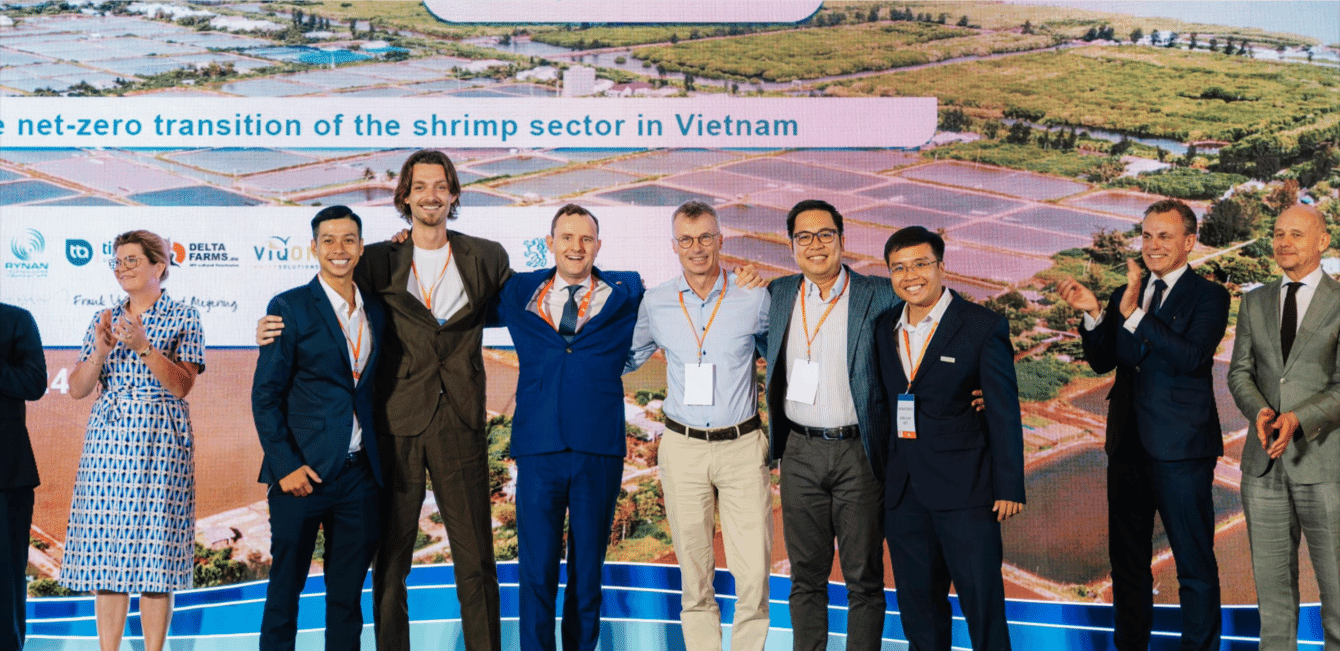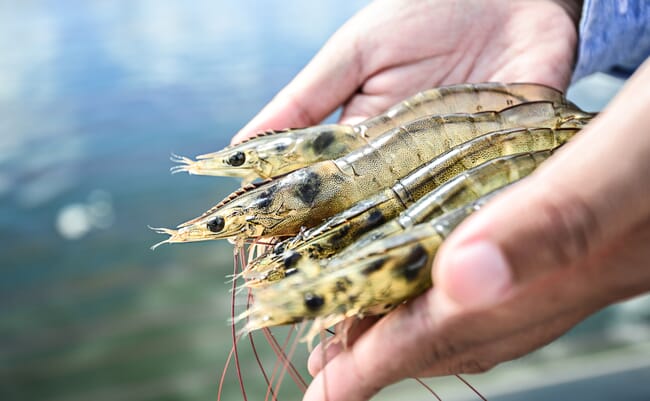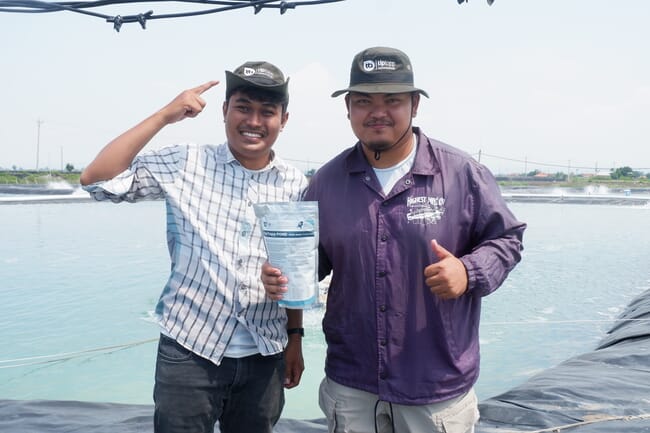
© Tiptopp Aquaculture
The Shrimp Tech Vietnam project, launched in 2020, is a two-phase initiative aimed at achieving net-zero shrimp production in Vietnam. The first phase focused on research and development, evaluating how sustainable practices could be integrated into shrimp farming in the local environment. This phase, which ran until 2023, sought to make sustainable practices accessible and feasible for local farmers.
Following the launch of the second phase of the project, Gian Muus, sales director of Tiptopp Aquaculture – a Dutch probiotics company, which is one of the project’s partners – provides insights into their objectives, achievements and future directions.
"The second phase, Shrimp Tech Vietnam 2.0, is all about implementation," Muus explains. "From 2023 to 2026, we're working to apply the findings from our research to real-world shrimp farming, with the ultimate goal of achieving a sustainable shrimp industry."
Tiptopp Aquaculture is one of seven consortium members contributing to this ambitious project. Other key partners include feed producer Skretting; Rynan Technologies, which offers technological innovations that increase the energy efficiency of farms; ShrimpVet, which specialises in disease detection and prevention; Fecom, a pond construction company; Topsy Baits, a live feed producer; and Sustainable Aquaculture Solutions, which provides guidance on shrimp health and disease prevention.
"This project is a collaborative effort initiated at the request of the Royal Dutch Embassy in Hanoi," Muus explains. "The Dutch government, through the Dutch Enterprise Agency (RVO), has provided substantial support, making this a truly international effort."
The state of shrimp farming in Vietnam
Vietnam's shrimp farming industry, which mainly takes place in the Mekong Delta, is one of the largest in the world, and the country is the leading producer of black tiger shrimp. However, rapid development has led to numerous challenges, including high disease prevalence, excessive antibiotic use and environmental degradation. Intensive farming practices without proper water treatment and land management have resulted in significant ecological damage, including the destruction of over half of Vietnam’s natural mangrove forests.
"The current way of intensive shrimp farming is unsustainable and damaging," Muus notes. "Farmers often lack access to best practices and are not fully aware of the broader issues related to market developments and environmental management."
Project goals and challenges
The primary aim of the project is to educate farmers and students about sustainable shrimp farming practices, ultimately achieving net-zero shrimp production through their implementation of these new technologies. Solar energy systems supplied by Rhinan are among these technologies; they use renewable solar energy and, through optimising the timing of energy production and consumption, cut the energy used per metric tonne of shrimp from 3,000 kWh to 1,500 kWh, negating the necessity for energy storage. Other technologies include Tiptopp’s probiotics. According to Muus, when used in Vietnamese nurseries, these have cause a significant drop in the feed conversion ratio (FCR): from an average of 1.6 to less than 1.0, while also increasing the water quality.
"We aim to educate as many farmers as possible, demonstrating best practices and implementing innovative technologies," notes Muus.
Despite the project's potential, significant challenges remain. The global shrimp market is currently in crisis, with plummeting prices affecting farmers' abilities to invest in new technologies. Vietnam and other countries with relatively high labour and input expenses find it difficult to compete with nations like Ecuador and India that can produce large quantities of shrimp at a lower cost.
"The main challenge is making sustainability accessible and affordable," Muus says. "We need to ensure that sustainable solutions actually reduce costs for farmers in the long term."

Strategies for reducing environmental footprint
The Shrimp Tech Vietnam project employs various strategies to reduce the environmental footprint of shrimp farming. These include organising educational seminars at universities, hosting roundtable discussions with key market players, and producing a documentary to raise awareness of the potential for sustainability in the supply chain and connect the final consumer to the farm. Importantly, much of the communication is conducted in Vietnamese to ensure accessibility.
Skretting's sustainable feeds, Rynan Technologies' energy-efficient innovations, and efforts to replant mangrove forests are critical components of the project.
"Mangrove forests provide coastal protection, water treatment, and habitat for various species," Muus explains. "We aim to integrate these forests into shrimp farms, dedicating one to two hectares of mangrove forest for every ten hectares of shrimp pond."
Tiptopp joined the project to use its expertise in probiotics to support the project's vision of sustainability.
"We knew we could contribute significantly with our probiotic solutions," Muus says. "Our goal aligns perfectly with the project's aim to make Vietnam's shrimp farming more sustainable."
According to Muus, by enhancing natural bacterial strains through fermentation, Tiptopp's probiotics improve water quality, reduce the need for antibiotics, and promote healthier shrimp. Benefits include decreasing silt accumulation in ponds, reducing disease-causing elements in the water, lowering ammonia levels, and improving feed conversion ratios. For example, probiotics can outcompete pathogenetic bacteria for nutrients, reducing harmful microorganisms in ponds. Other probiotics such as Nitrosomonas convert ammonia to nitrate decreasing the toxicity of the water. Additionally, further probiotics can increase shrimp gut health, aid digestion and stimulate shrimp immune systems, all leading to better overall shrimp health.
Learning from existing shrimp farms is a crucial aspect of the project.
"Every environment is different," Muus says. "We need to understand how farmers implement practices and what they can afford. We've been surprised by how effective probiotics can be in improving shrimp health and reducing disease in Vietnam."

The project employs innovative solutions such as probiotics to improve production efficiency © Tiptopp Aquaculture
Benefits and feedback
The project stands to benefit local farmers by improving shrimp quality, reducing production costs, and enhancing environmental sustainability. Additionally, the global supply chain will benefit from access to high-quality, sustainably farmed Vietnamese shrimp.
Feedback from the Vietnamese shrimp sector has been positive. "Diplomatic relations and support from Vietnamese ministers have been strong," Muus notes. "Initially, there was some reluctance from farmers to adopt new practices, but now there's a growing acceptance and eagerness to implement sustainable solutions."
The path to net-zero shrimp
Achieving net-zero shrimp production is a long-term goal that requires ongoing collaboration and innovation.
"The Dutch government wants to showcase how Dutch and Vietnamese innovation can lead to more sustainable shrimp farming," Muus explains. "We hope this project is just the beginning of a journey towards a more sustainable shrimp industry."
The consortium plans to continue supporting Vietnamese farmers and expanding sustainable practices even after the project's initial phases conclude. "Sustainability is about creating long-lasting solutions," Muus emphasises. "We want to revolutionise the shrimp industry and ensure that our practices benefit all stakeholders involved."
In conclusion, the Shrimp Tech Vietnam project exemplifies how international collaboration, innovative technology, and sustainable practices can begin to transform an industry. By addressing the environmental and economic challenges of shrimp farming, the project aims to set a new standard for aquaculture in Vietnam and beyond.




